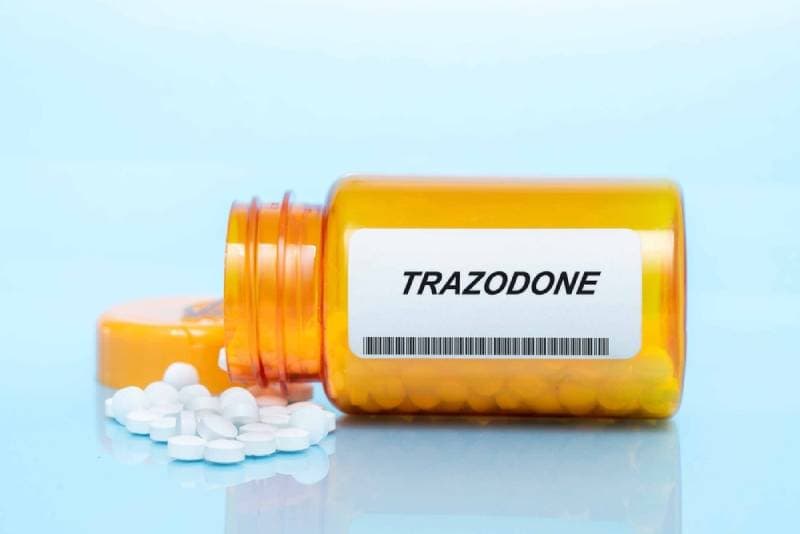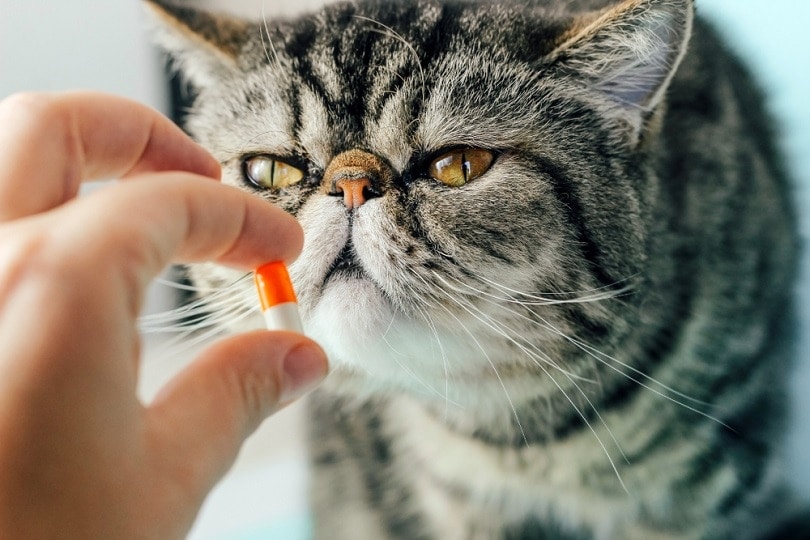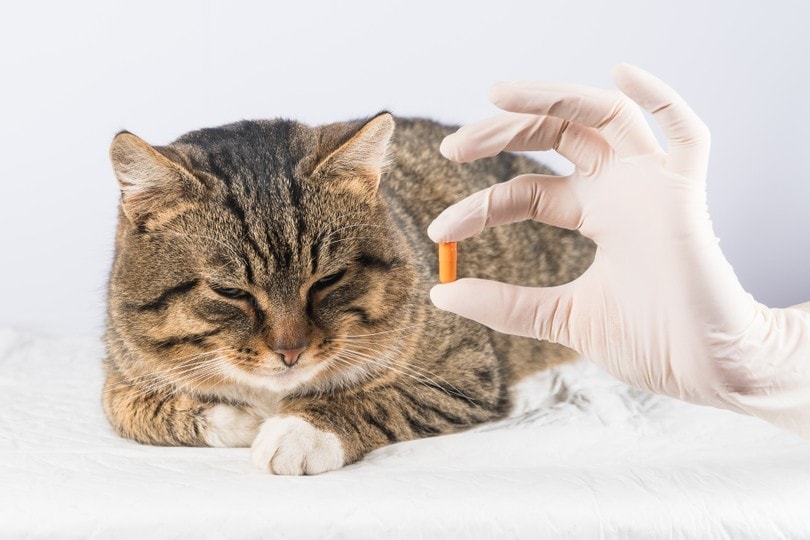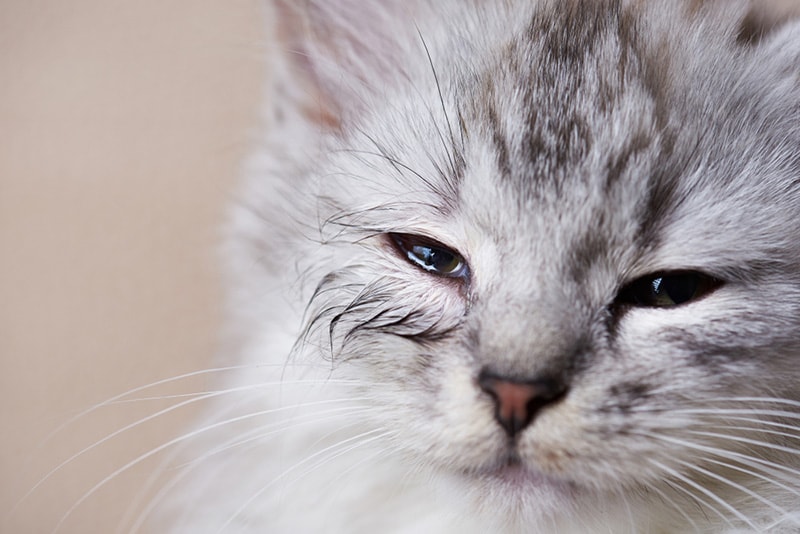Trazodone for Cats: Uses, Dosage & Side Effects (Vet Answer)

Updated on

There are many instances when cats require medication to help with their anxiety. Car travel, veterinary visits, hospital stays, fireworks, and thunderstorms are just a few circumstances in which behavior medication, such as trazodone, can be helpful in alleviating stress.
Trazadone has been used in human medicine since 1981 for the treatment of depression, anxiety, insomnia, and aggression. Although it is not yet officially licensed for animals, it can be used for the treatment of various behavioral problems in dogs and cats. It’s currently used more widely in dogs, though it does have a use for the feline population, particularly in instances of short-term anxiety and when mild sedation is required.
What Is Trazodone?
Trazodone is an antidepressant that acts on the nervous system to increase the serotonin levels in the brain. Serotonin is dubbed the “feel good” hormone, plays a role in mood and emotions, and contributes to digestion and the regulation of the body clock. Yet as with most current scientific knowledge, it is impossible to determine all the intricacies between serotonin and its effect on the body, and there is still much to learn about trazodone’s full effect on the brain. However, it does have a calming effect and is shown to be well-tolerated in cats. It can be given as needed or daily, depending on the requirements of your pet.

How Is Trazadone Given?
Trazodone is a tablet given by mouth on an empty stomach. It achieves peak effect 2 to 2.5 hours after administration, with the effects lasting greater than 4 hours. The tablets come in concentrations of 50 mg, 75 mg, and 100 mg. The recommended starting dose for cats is 25 mg and can be adjusted following the advice of your veterinarian.
In cases of situational anxiety, such as veterinary visits, travel, or noise phobias, it is important to give the medication 1 to 2 hours before the inciting event, to ensure the greatest effect of the medication. It is also important to note that food present in the stomach may delay the absorption of the drug, thereby limiting its efficacy.
Cats can be notoriously difficult to tablet. You must place the tablet as far back in their mouth as you can and hold their mouth shut until they swallow. Some cats make excellent gymnasts, and holding them in restraint is often a task in itself! Also, once you get them properly restrained, wait until they lick their lips before letting go of their mouth, and always check that they haven’t sneakily spat it out when you weren’t looking.
What Happens If You Miss a Dose?
If you miss a dose, give it as soon as you remember, but don’t double down on the missed dose by giving two doses. Just resume the ordinary dosing schedule. Overdosing on trazodone increases the risk of experiencing side effects.

Potential Side Effects of Trazodone
Side effects associated with trazodone in cats tend to be mild and transitory and can include any of the following:
- Weakness and instability
- Vomiting
- Diarrhea
- Agitation
- Increased heart rate
Trazodone can also cause “serotonin syndrome.” This occurs when the levels of serotonin become too high in the brain, causing tremors, difficulty breathing, an increased body temperature, and high blood pressure. Animals are most at risk of this when trazodone is combined with a drug that also acts on the serotonin levels in the body, so if your cat is taking any other medication, ensure with your veterinarian that they are safe to use together.
Frequently Asked Questions (FAQs)
My Cat Gets Anxious in the Car: Can I Use Trazodone for Travel?
A single dose of trazodone can be used to aid travel anxiety for cats. It is important to give it at least 1–2 hours prior to travel, so it has a chance to work in your cat’s system. It can cause side effects, so trying it at home first is advised. Also, remember that if you’re looking to travel by plane, most aviation lines prohibit the use of sedatives for pets. They will not be monitored if traveling as cargo, and it is somewhat difficult to get the help that they need if they have problems on the flight!
Is Human Trazodone the Same as Trazodone Used for Pets?
The trazodone that is used for pets is the same drug used by people. However, it is prescribed “off-label” for dogs and cats, as it is not yet officially licensed for animal use by the FDA. This is the case for many medications in the veterinary sphere, and veterinarians must follow a particular set of guidelines to ensure that a drug is appropriate. It is always important to follow your veterinarian’s instructions carefully.

Are There Any Other Options That I Can Use to Sedate My Cat?
You can talk to your veterinarian about other options to help your cat with anxiety. Gabapentin, for example, has proven to be a successful sedative for travel or for cats that are particularly stressed by visiting the vet.
When Should I Avoid Giving Trazodone to My Cat?
It should be used with caution in cats that have underlying conditions such as heart, liver, and kidney disease, and it should be avoided in pregnant or lactating cats, unless the benefit to your pet outweighs the risk (a decision to be made by your veterinarian).
What Happens If I Overdose My Cat on Trazodone?
In high concentrations, trazodone can be dangerous to your cat. If you are worried that your cat may have overdosed, please seek immediate veterinary attention.
Conclusion
While there is still more research required regarding the use of trazodone for cats, it is a drug that has proven uses for anxiety and sedation and has been shown to be well-tolerated, improving a cat’s behavior and calmness scores. As with any medication that is prescribed for your cat, always pay close attention to the instructions on the label and monitor and report any side effects to your veterinarian.
See also:
Featured Image Credit: luchschenF, Shutterstock












